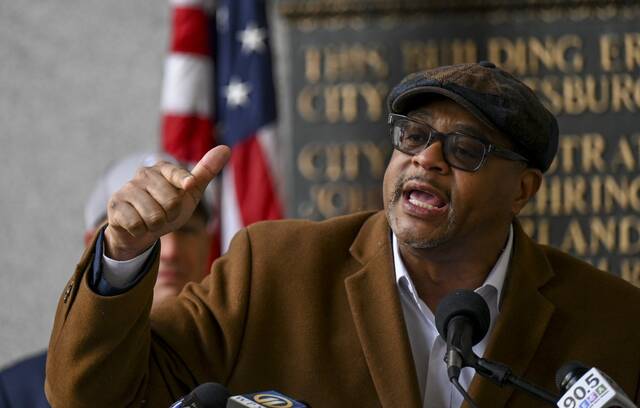Pittsburgh Mayor Ed Gainey on Monday slammed his opponent in the upcoming Democratic mayoral primary race for accepting campaign donations from Republicans.
But Gainey acknowledged he’s taken money from GOP contributors, too.
His challenger, Allegheny County Controller Corey O’Connor, said he’s proud to have gathered a diverse array of voters and small donations from everyday Democrats.
During a press conference at a North Side thrift store geared toward members of the LGBTQ community, Gainey’s campaign said O’Connor has brought in nearly $133,000 from donors who had supported Republicans.
The O’Connor campaign, meanwhile, pointed to about $82,000 of donations to Gainey that came from people with Republican ties.
At least one Republican donor, J. Clifford Forrest, CEO of Rosebud Mining and owner of Pittsburgh Brewing Co., the maker of Iron City beer, has donated to both men.
“We take our lead from the mayor,” O’Connor said.
Late Monday afternoon, Gainey’s campaign revealed it cut checks last week to refund Forrest and his wife, Tracy Forrest, for a total of $5,000 in donations made in 2021. A picture sent by the campaign showed the two checks, written on a Gainey for Mayor account at PNC Bank and marked “contribution refund.”
Sam Wasserman, who is managing Gainey’s campaign, told TribLive the checks to the Forrests were mailed Friday.
Forrest did not respond to a message seeking comment.
In a written statement, Wasserman said the Gainey campaign reviewed its donations after seeing “the overwhelming amount of MAGA money and operatives coming in to support Corey O’Connor.”
“Clifford Forrest is a mega donor to Trump and the RNC,” Wasserman said. “His values do not align with Pittsburgh Democrats, which is why the mayor returned the donation from the 2021 General Election.”
Wasserman differentiated between large Trump donors and “local bipartisan business owners and folks registered as Republicans” who give to Democratic candidates.
Other Republican donors, whose money Gainey is keeping, have also donated to Democratic candidates, Wasserman said. Some of them, he said, “are not Republicans in anything other than name only.”
Gainey and his supporters reason that if O’Connor accepts money from GOP donors, he must therefore support President Donald Trump’s positions attacking transgender people and immigrants.
Trump has signed a flurry of executive orders targeting those groups.
“If you take MAGA money, you carry MAGA values,” said Eddie Carpio, policy organizer at the Pittsburgh-based immigrant advocacy group Casa San Jose.
Chauntey Wilson, a transgender advocate, echoed that sentiment.
“I’m part of a community that is being attacked by Trump and Trump supporters such as Corey O’Connor,” Wilson said.
Gainey accused Trump supporters of “trying to buy the mayor’s election in Pittsburgh.”
But O’Connor said his campaign — which has significantly outpaced Gainey so far in fundraising — pitches a “progressive message” that isn’t hindered by more conservative donors.
“I think it shows he can’t talk about his vision for Pittsburgh,” O’Connor said of the mayor’s focus on Republican donors. “They can’t talk about his vision or his record, so they turn to something like this, which again, he got the same funds. I don’t know what his argument is.”
Gainey argued there was a difference between what he did and what O’Connor is doing now by taking money from Republican contributors during the run-up to the May 20 primary.
“That was four years ago in a general election when we were talking about building bridges across the bridge so we could make sure we have a strong economy,” Gainey said.
Spreading the wealth
Political experts said it’s common for Democrats to take money from Republicans and vice versa.
“It’s not unusual for candidates to receive donations from people of different parties,” said Berwood Yost, who oversees polling at Franklin & Marshall College in Lancaster.
Yost said Gainey is probably trying to rally his base of progressive voters and elicit an emotional reaction.
Joe DiSarro, a political science professor at Washington & Jefferson College, said Republicans likely feel their party is out of the running for the mayoral race — even though two Republicans are vying for the mayor’s office in a contested primary.
Pittsburgh hasn’t elected a Republican mayor in nearly 100 years, so DiSarro said it makes sense that Republican donors would back a Democrat they believe to be more moderate or more capable of addressing the problems the city faces.
“They want to have a voice,” he said. “And you’re not going to have a voice if you’re on the losing side consistently.”
Yost said a politician sending back money to donors is unusual.
“It’s not common to return (money),” he said.
Gainey also alluded to a meeting, reported Monday by The Guardian, between O’Connor and conservative nonprofit Commonwealth Partners, which is reportedly linked to billionaire conservative Jeffrey Yass.
The February meeting, held at the Duquesne Club in Downtown Pittsburgh, was attended by Democrats, Republicans and independents, according to O’Connor.
He said he was invited, but did not help orchestrate the gathering. O’Connor said there was no discussion of money while he was there.
“I was invited to speak to a group of business owners, Democrats, Republicans — there was a diverse room of business owners and people invested in our region,” he said. “There was nothing to do with Jeffrey Yass. I would never take Jeffrey Yass money or anything like that.”
O’Connor said he gave a speech on his vision for the city and left.
Jeremy Kazzaz, executive director of the Beacon Coalition, a nonprofit Jewish advocacy group in Pittsburgh, said he has no qualms about his organization’s $5,000 donation to O’Connor, even if Gainey has misgivings about some of his opponent’s contributors.
“I think there are a lot of people across Pittsburgh who are donating to the candidate they believe in,” Kazzaz said, adding he was disappointed Gainey was focusing on negative campaign rhetoric rather than more pressing issues, like a controversial ballot referendum his organization is fighting.








